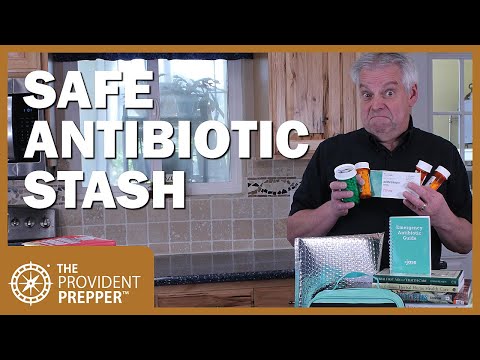In this article we will be looking at antibiotics and answering five important questions:
- What is an antibiotic?
- Common Antibiotics
- Human Body and Antibiotics
- How long do they last?
- The best way to stockpile and store

Preppers will want to stockpile antibiotics for SHTF to ensure they are healthy, as having any bacterial infection can stop you from conducting daily tasks, like scavenging, repairs or garden maintenance or defend yourself and your supplies, to survive you need to stay healthy.
So sit at your desks and get ready to take notes, as today’s lesson is in session.

What is an Antibiotic?
If your answer is a medication that helps fight bacterial infections. Full marks! As that is the basic idea of their function. An antibiotic is a type of antimicrobial life form designed to kill bacteria growth in or on your body.
There are many types of antibiotics depending on where the invading bacteria is located. They can come in three modern forms: tablets, ointments and injections which can include infusion via a drip. You can also get natural antibiotics, like honey and cranberry.
This should be an understood fact of life by now, but it bears repeating because the misconception is so prevalent. Antibiotics only treat bacterial infections. Bacterial infections and that is all. Antibiotics do absolutely nothing against viral infections, fungal infections or any other sort of malady.
If someone is sick or injured and a bacterial infection is present, antibiotics can help the overall condition of the patient even if the bacterial infection is not the primary threat because it eliminating the bacteria it will reduce the work load of the body’s natural immunity and repair systems.
Antibiotics are not a cure-all and they are sure as hell not a panacea. Prepare, and act, accordingly.
Common Antibiotics
Common antibiotics can be brought over the counter, they are not as strong as prescription, and some are even herbal.
Commonly prescribed antibiotics:
- Clindamycin
- Azithromycin
- Ciprofloxacin
- Amoxicillin
- Cephalexin
- Amoxicillin / Clavulanate
- Metronidazole
- Sulfamethoxazole / Trimethoprim
- Levofloxacin
- Doxycycline
These are usually the most prescribed to patients, or they’re over counter.
Common first-aid antibiotics and natural remedies include:
- Neosporin (bacitractum, neomycin and polymyxin b) is the most famous of antibiotics. Usually, an ointment for minor cuts and reduce scarring.
- Bactine (1,2-Hexanediol, Bisabolol, Caprylic/Capric, etc) used to treat skin conditions helps reduce scarring and infection.
- Aloe Vera for antifungal, antibacterial and antiviral.
- Cranberry is a good antibiotic for urinary infections.
- Honey used for centuries directly on wounds then covered.
It must be pointed out that antibiotics themselves might be for very specific bacterial threats, or they might be a so-called all-purpose or wide spectrum antibiotic.
The latter category in particular features several varieties, ciprofloxacin among them, that is often used as a prophylactic or preventative antibiotic in case of injury or wounding in an austere environment, the idea being that the early squashing of any potential bacterial infection will dramatically improve the prognosis of the patient as accessing higher level care may be difficult or impossible.
This does not necessarily mean that an all-purpose antibiotic is the best or only choice for you, but they are generally a good thing to have as a component and a well-rounded preparedness plan and definitely for inclusion in a first-aid kit or trauma pack.
The Human Body and Antibiotics
Carrying on from our last lesson, each area of the human body requires different antibiotics, so your stockpile must reflect this. Some people are allergic to certain antibiotics like penicillin. If you are going to stockpile antibiotics then you must accumulate the knowledge about them.
Normally, people know what antibiotics they are allergic to and you can trade and use accordingly, however, sometimes they will not know and in that situation, an alternative might be better, which would also be a good idea to stockpile or learn to cultivate, like honey, which was used for centuries as an antibiotic.
How Long Will They Last For?
Many antibiotics will last two to three years, meaning compared to other items that can be stockpiled, they do not last long. However, that time frame still means you have something in reserve for emergencies.
That being said, keeping antibiotics for longer than the shelf life could mean they will start to grow bacteria and lose their ability to treat an infection. The shelf life varies depending on the manufacturer.
To stockpile antibiotics, the best choice tends to be tablets or pills, then vacuum seal the boxes, then
Under these conditions, you can increase their life by one to two years. Herbs and natural remedies may not have the same shelf life as modern medication, so will either be made fresh or if they can be saved, they tend to seal in an airtight jar.
If you decide to cultivate, then as long as you maintain them you have a backup supply that will last as long as you maintain it.
Understand that no matter what you do your antibiotics will still slowly break down and lose their potency over time even when stored a perfectly according to the guidelines above.
Precise studies on the longevity of antibiotics in various environments have been done, but the results may not be informative for our purposes, or indicative of typical performance and the many variables attendant with production and storage of antibiotics.
Accordingly, you must be prepared to rotate your antibiotics like any other perishable good, and be diligent about doing so.
Relying upon expired antibiotics could be worse than useless and seriously endanger your life or the life of someone else. This is yet another expense you’ll have to stay on top of in your quest to stay personally prepared for whatever life throws your way, but it is one that you must be willing to pay.

The Best Way to Stockpile and Store
The first component of stockpiling antibiotics is actually obtaining them. Unfortunately, antibiotics are a prescription item, at least for human consumption.
This means unless you want to resort to some dodgy internet purchases you’ll have to find a sympathetic doctor who understands your desires to be prepared, trusts you, and is willing to write you a bulk prescription so you can outfit your first-aid kits and survival stash.
This might be your family doctor or it might not, but I would argue that your family doctor should be of a mind to help you and your family stay as healthy as possible under the widest possible variety of circumstances, so if they aren’t amenable to this request for such a mild drug, find a new one.
If you don’t want to go through all the regular roll of getting an indefinite term, indefinite quantity subscription out of your doctor, and you don’t want to resort to an iffy internet purchase I have good news for you.
You can freely get fish antibiotics off the internet! I can already hear the squealing down in the comments, but hear me out.
Fish antibiotics are usually made in the same factories in the same way and from precisely the same components as antibiotics intended for human or mammal consumption. As luck would have it, you can even get them in the same doses typical of human consumption.
The trick is only in figuring out what antibiotics are required, finding a trustworthy supplier of fish antibiotics, which is not difficult, and then reading the ingredients list to make sure there are no additives and that you’re getting pure antibiotics.
You don’t want fish antibiotics that have added vitamin boosters, fungal suppressors or other things that are actually intended for fish.
You can store your stockpile in a secure place that is dark and cool, with each box vacuum-sealed in a
vacuum bag to preserve the antibiotics for a little longer.
You can seal each box individually using small seal bags, which I’d say is better to help preserve the others of its group and store it off the ground as water or any fluids will destroy the antibiotics.
The ointments will need to be stored in a cold dark place and may not last as long as tablets or pills. You can start potted herb plants and this will ensure that you have a long term backup to your stockpile.
Any herbs and natural ingredients you pick and make into remedies should be stored in airtight jars to help preserve them. These also make good pots for prepper toothpaste powder.
Final Thoughts
Stockpiling antibiotics to keep you healthy and active is good. Growing or cultivating will also be good as
They will replace the modern medication. This also makes a great activity to keep you focused as you will need to take regular stock numbers and tend to a garden, which will help you keep mentally healthy.


